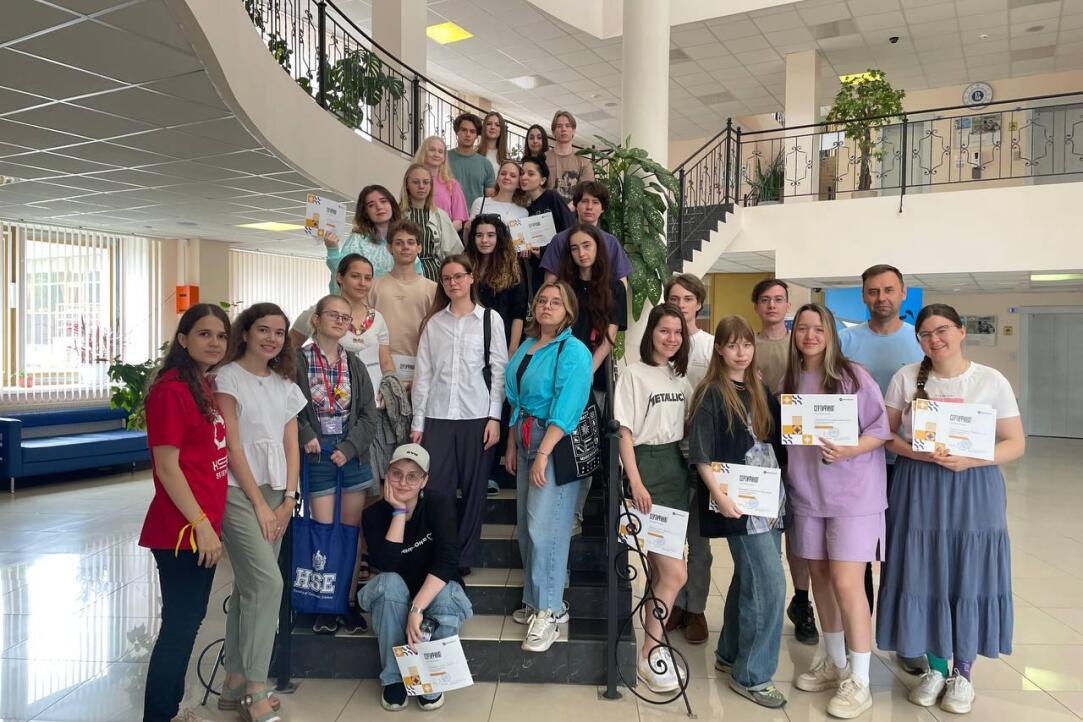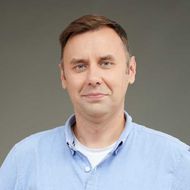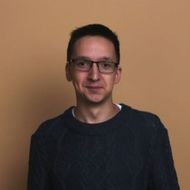Scientarium: Integrating Student Scientific Associations and HSE University Projects

In early July, the Voronovo Study Centre hosted Scientarium, an off-site session for representatives of HSE University student research communities organised by the university’s Centre for Student Academic Development and Unit for the Popularisation of Science. More than 50 students from 10 scientific student associations and three campuses took part.
Student Science
The meeting’s agenda included identifying the problems of young researchers and the state of student scientific associations, building a plan for the joint development of student research projects for the next year, and forming a community of young HSE University scientists.
Student science at HSE University comprises a multitude of student initiative centres, clubs, and groups. The university offers a large number of tools, support measures, projects, and competitions. One important condition is effective scientific communication that takes into account the differences in student formats and the scientific cultures behind them: physicists, sociologists, philologists, etc.
A few years ago, the Scientarium educational intensive was created at HSE University by the Centre for Student Academic Development (CSAD). This year, for the first time, it was held at the Voronovo Study Centre. Over four days, students and managers met to consider a plan for the 2023/24 academic year. The goals of the visiting session were to prepare the student scientific avant-garde for joint work in the next academic year and the development of plans for joint activities.
On the first day of the meeting, students from various HSE University academic associations got to know each other and learned about the specifics of each project. During the second and third days, they divided into small groups to create plans for the development of their student association, focusing on experience and knowledge in the field of project scientific activity.
Public speaking is an essential skill for young scientists today. In her lecture, Tatyana Makarova, Manager of the Centre for Student Academic Development, explained how to convey scientific knowledge to a wide audience in simple and understandable language.
Most of the time was devoted to intensive work, but the evening activities from the Training School allowed the students to take a breath. The activities allowed the students to acquire important teamwork skills such as communication and the ability to negotiate and distribute roles.
‘For five years, my colleagues and I have been looking for a way to gather a scientific student community, not only by developing a system of centralised support from above at the university, but also by creating a favourable environment for the development of independent student projects ranging from popular science and the scientific to the educational,’ says Andrey Kozhanov, Director of the Centre for Student Academic Development and the Moscow city branch of the Russian society Znanie. ‘Live communication at the field session showed that we are ripe for integrating one and the other: to strengthen the “Science Republic” project to support young scientists with energy and ideas from the most active HSE University scientific communities.’
‘One of the important missions of the Centre for Student Academic Development and the Scientarium trip is to let students build a personalised track for their participation in research and scientific-educational activities using tools for scientific communication. This allows everyone to determine their own area of interest in the large and diverse scientific landscape,’ says Denis Smetanin, manager of the centre and coordinator of the projects ‘Travel Grant’ and ‘Student Scientific Event’.
On the final day, each of the teams presented the results of their reflection on their project and plans for the next academic year.
‘Thanks to the trip, we managed to make new acquaintances with people from various scientific student organisations and get more detailed information about opportunities to participate in student science,’ says Anastasia Bochkor, participant of the ‘Science Republic’ project. ‘This allows us to continue to successfully realise ourselves in the scientific field, and motivates us to engage in new research and be actively involved in student activities.’
‘The trip gave a great boost of motivation to develop our student scientific association, to hold events,’ says Angelina Vershinina, Chairperson of the Student Scientific Association at HSE University in Nizhny Novgorod. ‘It was great to see how other scientific organisations live. This made it possible not only to exchange experiences, but also to look at ourselves and our activities from the outside.’
‘One of the problems of student associations at our university is disunity, and this is especially reflected in scientific communities,’ says Arina Simonova, participant of the ‘Academic Curators’ project. ‘Scientarium gave all of us the opportunity to get acquainted with the activities of different teams and with our peers in the organisation. This is especially important for identifying existing problems, finding solutions to them, and building a development trajectory. As for me personally, I talked to people from various HSE University educational programmes and found out how diverse research is at the university: there is not a single faculty that is not engaged in it.’
See also:
‘It’s Important to Me Not to Rest on My Laurels’
Uliana Kisataeva, a student at the HSE Graduate School of Business, was one of the winners of the UN Global Compact PRME 2025 Business Case Competition supported by the United Nations. As part of the competition, Uliana presented a digital platform called Green B2B Match, which can help businesses reduce their carbon footprint and contribute to the development of responsible consumption. In an interview with the HSE News Service, she spoke about her project, the competition, and her victory.
Real Tasks and Direct Interaction with Employers: HSE School of Foreign Languages Holds Poster Session
For the second time, the HSE School of Foreign Languages has held a defence of specialised projects developed by fourth-year students of the Bachelor’s Programme in Foreign Languages and Intercultural Communication. Representatives of major companies and organisations that support the school’s project activities gathered to evaluate the projects during a poster session.
From Ingenious Fungi to Post-feminism: HSE University Hosts Season’s Last Science Battles Semi-Final
Season VI of Science Battles at HSE University is entering the homestretch. The June semi-final determined the list of finalists and helped many viewers choose their favourites. This time, young researchers decided to figure out how to conduct a police lineup without destroying a person’s life, as well as how to improve a child’s academic performance without instilling neurotic perfectionism. They also found out that fungi and mould help heal scars and save the environment, and that adherents of post-feminism have very mixed feelings about their own images on TikTok.
Smart Medicine, Libration Points and Electromyographic Bracelets: MIEM Students Present Their Projects
In February, a two-day poster session - the second checkpoint of the project life cycle - was held at the HSE MIEM. The participants prepared colorful posters, talked with experts and MIEM students and received well-deserved plaudits. Here, the HSE News Service looks at some student projects.
Submarine and French Confectioner's Shop—Winners of the Top Class Research Competition Announced
This year’s final stage of Top Class, the All-Russian Competition of Schoolchildren’s Research and Projects, held by HSE University, has come to a close. About a thousand 8th—11th graders from 7 countries and 69 regions of Russia participated in the contest. The winners and runners-up were announced at the closing ceremony in the HSE Cultural Centre. They received special prizes from partner companies.
Winning Research Initiative Projects to be Implemented by the End of 2022
In April, the results of the Research Initiative student project competition were announced at HSE University. Twenty-two team applications were submitted by students of 20 different fields of study at HSE University’s campuses in Moscow, Perm, and Nizhny Novgorod. Based on the results of expert assessment, the competition committee approved 17 interdisciplinary projects to be implemented by December 2022.
HSE University Holds School of Snow in Perm Region
On February 15–17, the Winter SOS (School of Snow) was held at the Zhebrei ski resort. The event was organised by the HSE Perm Tourist Club and the Student and Alumni Centre. In addition to learning to ski and snowboard, students from all HSE University campuses developed and defended projects focused on the development of domestic tourism in their regions. SOS participants shared their impressions with the HSE News Service.
Registration Opens for ‘Research Initiative’ Team Project Competition
The HSE Centre for Student Academic Development has started accepting applications for the third ‘Research Initiative’ student team research project competition. Bachelor’s and master’s students from all HSE campuses are eligible to participate. The competition gives students an opportunity to not only take on research roles, but also to try their hand at working as academic managers and supervisors of a small research team. Registration will remain open until February 28.
HSE Master’s Students on the Professions of the Future
Students in the Transmedia Production in Digital Industries Master’s programme have done a project on the professions of the future. Covering trends and key professions, the project helps students assess potential academic trajectories. The main part of the project is a non-fiction book ‘What’s Next? Professions of the Future’, which is based on the ‘Androids and Electric Sheep’ podcast by Forbes and X5 Group. The book has been published on the Ridero platform.
‘Our Distinction Is Our Core Areas of Research’
In his interview for the HSE LooK, Evgenii A. Krouk, the Acting Director of HSE Tikhonov Moscow Institute of Electronics and Mathematics, talks about the distinctive features that set the institute apart, the place of project-based learning on the curriculum, research areas with the highest potential, and his vision for HSE MIEM future development.




